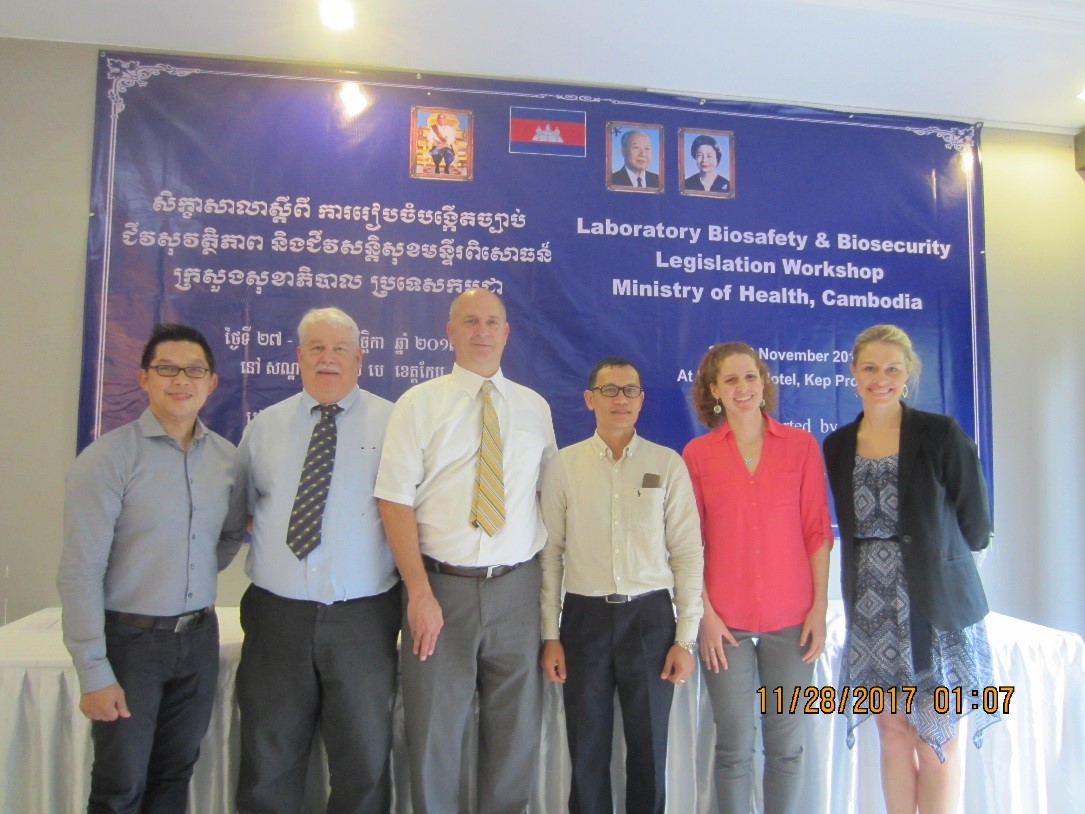CDC in Cambodia – Strengthening laboratory biosafety and biosecurity through legislation

Laboratory Biosafety & Biosecurity Legislation Workshop participants
Strengthening laboratory capacities is a process that often includes workforce training, introducing new diagnostics and the development of laboratory protocols. However, Emily Rosenfeld, a member of the Center for Global Health’s (CGH’s) public health law team notes, “another technical aspect that has increasingly become part of the conversation is what role law plays in achieving and shaping public health outcomes.” With the increased growth of higher-tiered BSL laboratories, some countries have chosen to develop laboratory biosafety and biosecurity systems across human, animal, and agricultural facilities by enacting laws that create governmental accountability for regulating laboratory biosafety and biosecurity.
In November 2017, laboratory leadership from the Cambodian Ministry of Health (MOH) worked with technical experts across CGH, CDC’s National Center for Emerging and Zoonotic Infectious Diseases, and CDC Cambodia to facilitate a workshop geared toward strengthening biosafety and biosecurity practices within Cambodia’s national laboratory network. The workshop focused on the role of law as a public health tool and outlined a Prakas (Ministerial Proclamation) for management of laboratory highly dangerous pathogens and toxins.

CDC Staff (L-R) Sar Borann, Bruce Newton, Jerry Pellegrini, Dr. Sau Sokunna, Emily Rosenfeld, Jennifer Bohl
This successful workshop and subsequent ongoing collaboration included technical experts from across CDC as well as across Cambodia’s public health system. Dr. Sau Sokunna, Deputy Director, Bureau of Medical Laboratory Services in the Cambodia MOH, chaired the workshop, which included representatives from the World Health Organization (WHO), Cambodian laboratory directors, the MOH Legislation Department, and various nongovernment organizations working within Cambodia’s public health system. Dr. Borann Sar, Laboratory Advisor, CDC Cambodia, reiterated how exciting it is to be working on a first-of-its-kind effort with the Cambodian government in developing “laboratory biosafety legislation to help protect laboratorians and the public from accidental exposures to dangerous pathogens.”
A Prakas is a ministerial proclamation signed by the minister that establishes practices within its facilities. This is the first step in creating a Kram (national law) to establish laboratory controls over all highly dangerous pathogens and toxins within Cambodia laboratories. Drawing upon recommendations outlined in Cambodia’s Joint External Evaluation of International Health Regulations conducted by WHO in 2017, this Prakas is intended to help increase compliance with various laboratory safety provisions involving management of laboratory hazardous pathogen and toxins. Gerald Pellegrini, a microbiologist with CDC’s Division of Global Health Protection (DGHP) explains that “national legislation development is a critical first step in implementing a top-down approach to strengthening laboratory biosecurity practices within Cambodia public health laboratories.”
This Prakas, when passed, will be the first regulation within the Cambodian MOH created to improve laboratory safety involving possession, use, storage, and transfer of dangerous biological pathogens within public health laboratories in Cambodia. Project teams across the Division of Preparedness and Emerging Infections, DGHP, and the CGH Office of the Director will continue to provide technical assistance as part of this collaboration with the Cambodian MOH as they finalize the development of this Prakas.
For more information please contact Emily Rosenfeld at yhc5@cdc.gov or Jerry Pellegrini at gcp2@cdc.gov.